Overview
- Brief Narrative
- Ration card stub for bread rolls, wheat or wheat flour valid from November 23 – December 20, 1942 issued to Josef Polacek by the Ministry of Land and Forestry. During the war food was strictly rationed in German controlled regions and Jews were allowed much smaller portions than the general public. To identify the owners as Jewish, the cards were first stamped with a large J and later the entire card was covered with inscriptions of “Jude’. Josef lived in Prague when it was invaded in March 1939 by Germany and made part of the Protectorate of Bohemia and Moravia. The authorities passed new anti-Jewish regulations that severely restricted Josef’s daily life. In September, Germany invaded neighboring Poland. In September 1941, Josef was required to wear a yellow Star of David badge at all times to identify himself as Jewish. Later that month, Reinhard Heydrich became Reich Protector and soon there were almost daily deportations of Jews to concentration camps. On December 13, 1942 Josef committed suicide rather than being deported east. On May 7, 1945 Germany surrendered, ending the war. Josef’s daughter, Elisabeth (Liese) Trausel and granddaughter, Hana Trausel (later Rehakova) survived the war.
- Date
-
use:
1942 November 23-1942 December 20
- Geography
-
use:
Prague (Czech Republic)
- Credit Line
- United States Holocaust Memorial Museum Collection, Gift of Hana Rehakova
- Markings
- front, top, printed black : 42. Ausgabe vydáni 11A / gültig von Plati od / 23. XI. -20.XII. 1942 [42nd edition / valid from / November 23- December 20 1942]
front, top, right, printed seal, black ink : Ministerium für Land- und Forstwirtschaft / Ministerstvo zemědělství a lesnictvi [Ministry of Land and Forestry]
front, center, printed black ink : Brottarte lístek na chléb / Böhmen und Mähren Čechy a Morava [Bread roll / Bohemia and Moravia]
front, center, preprinted and handwritten, black ink : Name Jméno Dr. Josef Polacek (handwritten) / Wohnort Bydliště Praha V (handwritten) / Straße Ulice Norimbeska 22 (handwritten) [Name / Place of Residence Prague / Street]
front, bottom, printed, black ink : Ohne Namenesintragung ungültig. Nicht übertragbar. - Sorgfältig aufbewahren / Bez vepsáni jměna neplatně. Nepřenosně. - Pečlivě uschovejte! [Invalid without name entry. Not transferable. - Keep in a safe place!]
front, bottom, printed black ink : a - Ubschnitte gelten für Weizgebäd oder Weizenmehl. / a - ústřižky platí pro bílé pečivo nebo pšeničnon mouku [coupons valid for wheat or wheat flour]
front, bottom coupon, printed, black ink : 42 BM CM / Sonderabschnitt Zvláštní ústřižek 11A / 23. XI. – 20. XII.1942 [Special coupon November 23- December 20 1942] - Contributor
-
Subject:
Josef Polacek
Issuer: Ministry of Land and Forestry
- Biography
-
Josef Polacek was born on November 2, 1870, in Austro-Hungary, to a Jewish couple. He became a doctor. He married Stefanie, who was born on March 3, 1875. The couple settled in Prague, Austro-Hungary (Czech Republic). They had one daughter Elisabeth (1902-1978), who went by the nickname Liese. The Austro- Hungarian Empire collapsed at the end of World War I (1914-1918) and Prague became part of the newly independent Czechoslovak Republic. Liese, married a non-Jewish man, Mr. Trausel, and the couple had two daughters, Eva and Hana (1930 - 2007).
After 1933, when the Nazi regime came to power in Germany, Prague saw a large influx of Jews fleeing persecution. On February 4, 1938, Josef’s wife, Stefanie, died. In September, Germany annexed the Sudetenland border region. In March 1939, Germany annexed the Czech provinces of Bohemia and Moravia, where Prague was located, and placed them under the control of a Reich Protector. Other regions were absorbed by German allies and Czechoslovakia ceased to exist. Jewish life was restricted. Jews were banned from most professions and organizations, lost their property, and had to live with curfews. Few shops would serve Jews, who were allowed shop only during a few hours each day. On September 1, 1939, Germany invaded neighboring Poland. Two days later, England and France declared war on Germany.
In September 1941, Czech Jews were required to wear a yellow Star of David badge sewn to their clothing at all times to make them easy to identify. At the end of the month, Reinhard Heydrich, SS Chief of Security for the Reich, became Reich Protector, and prioritized the expulsion of Jews to concentration camps. Regular deportations of Jews from Prague began, with daily transport notices in the newspapers. Exempted from these deportations were several groups of Jews, including those that were married to non-Jews and their half Jewish children, like Josef’s daughter, Liese, and his granddaughters, Eva and Hana. As the war progressed, food rationing increased and was strictly controlled with official ration cards. Non-Jewish citizens were granted much larger quantities of sugar, potatoes, bread, and other necessities than Jews. They were also issued cards for additional items like fruit and vegetables, which were not available to Jews. The cards issued to Jews were marked to clearly identify them. Josef, learned that he was to be deported to the east, and committed suicide on December 13, 1942, rather than be taken away by force.
On May 7, 1945, the war ended following Germany’s surrender. Josef’s daughter, Liese, had been transported to Theresienstadt ghetto-labor camp north of Prague, and held there as a prisoner. After the war, she was released and returned to Prague. While Liese was being held, Eva was assigned to carry out compulsory work while her sister, Hana, was at the hospital. The family later learned that many of the extended family members and friends that had been held in ghettoes, concentration, and labor camps had all been deported to concentration camps to the east and killed.
Physical Details
- Classification
-
Exchange Media
- Category
-
Coupons
- Object Type
-
Ration cards (lcsh)
- Physical Description
- Irregularly cut ration card stub on light weight pink paper with a light red latticework and text patterned background and black German and Czech text preprinted in fraktur font. In the top right corner is the seal of the Bohemia; a circular seal with a stylized, two tailed lion in the center ringed by text. An encircled J is stamped on the top and bottom of the document. At the top is the use date and several lines of text. The center lines are filled in with black handwritten text and the bottom has four more lines of text. There is a black border around the perimeter and a square coupon is still attached to the bottom.
- Dimensions
- overall: Height: 4.625 inches (11.748 cm) | Width: 3.375 inches (8.573 cm)
- Materials
- overall : paper, ink
- Inscription
- front, top and bottom, stamped, black ink : J within a circle
Rights & Restrictions
- Conditions on Access
- No restrictions on access
- Conditions on Use
- No restrictions on use
Keywords & Subjects
- Topical Term
- Concentration camp inmates--Czech Republic--Terezin (Ustecky kraj)--Biography. Holocaust, Jewish (1939-1945)--Czech Republic--Personal narratives. World War, 1939-1945--Conscript labor--Personal narratives, Czech. Jews--Czech Republic--Prague--Biography. Holocaust, Jewish (1939-1945)--Czech Republic--Personal narratives.
Administrative Notes
- Legal Status
- Permanent Collection
- Provenance
- The ration card was donated to the United States Holocaust Memorial Museum in 1992 by Hana Rehakova, the granddaughter of Josef Polacek.
- Funding Note
- The cataloging of this artifact has been supported by a grant from the Conference on Jewish Material Claims Against Germany.
- Record last modified:
- 2023-05-17 13:38:50
- This page:
- https://collections.ushmm.org/search/catalog/irn5882
Download & Licensing
In-Person Research
- By Appointment
- Request 21 Days in Advance of Visit
- Plan a Research Visit
- Request to See This Object
Contact Us
Also in Elizabeth Trausel family collection
The collection consists of documents, scrip, and a Star of David badge that relating to the experience of Elisabeth Trausel in Prague and Theresienstadt ghetto labor camp and her father Josef, and their family in Prague during the Holocaust.
Date: 1940-1945
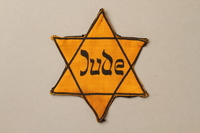
Star of David badge with Jude worn by a Jewish Czech woman
Object
Star of David badge worn by Elisabeth (Liese) Trausel in German occupied Prague following the September 1, 1941 order requiring Jews in Czechoslovakia to wear the Yellow Star of David badge at all times. The badge has pins sewn in to allow for easy removal from clothing so as to not be identified as a Jew. This allowed Liese to partake in actions that were prohibited for Jews such as crossing streets which were not open to Jews or taking trips by street car. Prague was invaded in March 1939, by Germany and made part of the Protectorate of Bohemia and Moravia. The authorities passed new anti-Jewish regulations that severely restricted Liese’s daily life. In September, Germany invaded neighboring Poland. In September 1941, Reinhard Heydrich became Reich Protector and soon there were almost daily deportations of Jews to concentration camps. Liese was married to a non-Jewish man and her daughters were considered half-Jewish, which exempted all three women from being transported. On December 13, 1942, Liese’s father Josef Polacek was facing deportation and instead committed suicide. In June and December 1943, many of the exemptions protecting particular groups were waived and more Jews were transported. On September 1, 1944, Liese was assigned to do compulsory work. Later that fall, she was transported to Theresienstadt ghetto-labor camp north of Prague. In April 1945, Hana was in the hospital and Eva was assigned to a compulsory work detail. Theresienstadt was taken over by the Red Cross on May 2, 1945. The war ended 5 days later when Germany surrendered. Liese returned to Prague. Many of her relatives and friends were killed in German concentration camps.
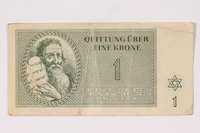
Theresienstadt ghetto-labor camp scrip, 1 krone note
Object
Scrip valued at 1 krone acquired by to Elisabeth (Liese) Trausel who was imprisoned in Theresienstadt ghetto-labor camp from fall 1944 until liberation in May 1945. Liese lived in Prague when it was invaded in March 1939, by Germany and made part of the Protectorate of Bohemia and Moravia. The authorities passed new anti-Jewish regulations that severely restricted Liese’s daily life. In September, Germany invaded neighboring Poland. In September 1941, Liese was required to wear a yellow Star of David badge at all times to identify herself as Jewish. Later that month, Reinhard Heydrich became Reich Protector and soon there were almost daily deportations of Jews to concentration camps. Liese was married to a non-Jewish man and her daughters were considered half-Jewish, which exempted all three women from being transported. On December 13, 1942, Liese’s father Josef Polacek was facing deportation and instead committed suicide. In June and December 1943, many of the exemptions protecting particular groups were waived and more Jews were transported. On September 1, 1944, Liese was assigned to do compulsory work. Later that fall, she was transported to Theresienstadt ghetto-labor camp north of Prague. In April 1945, Hana was in the hospital and Eva was assigned to a compulsory work detail. Theresienstadt was taken over by the Red Cross on May 2, 1945. The war ended 5 days later when Germany surrendered. Liese returned to Prague. Many of her relatives and friends were killed in German concentration camps..
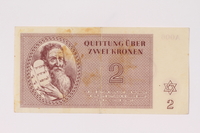
Theresienstadt ghetto-labor camp scrip, 2 kronen note acquired by a Jewish Czech woman
Object
Scrip valued at 2 kronen acquired by Elisabeth (Liese) Trausel who was imprisoned in Theresienstadt ghetto-labor camp from fall 1944 until liberation in May 1945. Liese lived in Prague when it was invaded in March 1939, by Germany and made part of the Protectorate of Bohemia and Moravia. The authorities passed new anti-Jewish regulations that severely restricted Liese’s daily life. In September, Germany invaded neighboring Poland. In September 1941, Liese was required to wear a yellow Star of David badge at all times to identify herself as Jewish. Later that month, Reinhard Heydrich became Reich Protector and soon there were almost daily deportations of Jews to concentration camps. Liese was married to a non-Jewish man and her daughters were considered half-Jewish, which exempted all three women from being transported. On December 13, 1942, Liese’s father Josef Polacek was facing deportation and instead committed suicide. In June and December 1943, many of the exemptions protecting particular groups were waived and more Jews were transported. On September 1, 1944, Liese was assigned to do compulsory work. Later that fall, she was transported to Theresienstadt ghetto-labor camp north of Prague. In April 1945, Hana was in the hospital and Eva was assigned to a compulsory work detail. Theresienstadt was taken over by the Red Cross on May 2, 1945. The war ended 5 days later when Germany surrendered. Liese returned to Prague. Many of her relatives and friends were killed in German concentration camps.

Theresienstadt ghetto-labor camp scrip, 5 kronen note acquired by a Jewish Czech woman
Object
Scrip valued at 5 kronen acquired by Elisabeth (Liese) Trausel who was imprisoned in Theresienstadt ghetto-labor camp from fall 1944 until liberation in May 1945. Liese lived in Prague when it was invaded in March 1939, by Germany and made part of the Protectorate of Bohemia and Moravia. The authorities passed new anti-Jewish regulations that severely restricted Liese’s daily life. In September, Germany invaded neighboring Poland. In September 1941, Liese was required to wear a yellow Star of David badge at all times to identify herself as Jewish. Later that month, Reinhard Heydrich became Reich Protector and soon there were almost daily deportations of Jews to concentration camps. Liese was married to a non-Jewish man and her daughters were considered half-Jewish, which exempted all three women from being transported. On December 13, 1942, Liese’s father Josef Polacek was facing deportation and instead committed suicide. In June and December 1943, many of the exemptions protecting particular groups were waived and more Jews were transported. On September 1, 1944, Liese was assigned to do compulsory work. Later that fall, she was transported to Theresienstadt ghetto-labor camp north of Prague. In April 1945, Hana was in the hospital and Eva was assigned to a compulsory work detail. Theresienstadt was taken over by the Red Cross on May 2, 1945. The war ended 5 days later when Germany surrendered. Liese returned to Prague. Many of her relatives and friends were killed in German concentration camps.
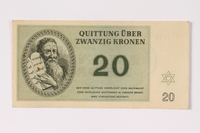
Theresienstadt ghetto-labor camp scrip, 20 kronen note acquired by a Jewish Czech woman
Object
Scrip valued at for 20 kronen acquired by Elisabeth (Liese) Trausel who was imprisoned in Theresienstadt ghetto-labor camp from fall 1944 until liberation in May 1945. Liese lived in Prague when it was invaded in March 1939, by Germany and made part of the Protectorate of Bohemia and Moravia. The authorities passed new anti-Jewish regulations that severely restricted Liese’s daily life. In September, Germany invaded neighboring Poland. In September 1941, Liese was required to wear a yellow Star of David badge at all times to identify herself as Jewish. Later that month, Reinhard Heydrich became Reich Protector and soon there were almost daily deportations of Jews to concentration camps. Liese was married to a non-Jewish man and her daughters were considered half-Jewish, which exempted all three women from being transported. On December 13, 1942, Liese’s father Josef Polacek was facing deportation and instead committed suicide. In June and December 1943, many of the exemptions protecting particular groups were waived and more Jews were transported. On September 1, 1944, Liese was assigned to do compulsory work. Later that fall, she was transported to Theresienstadt ghetto-labor camp north of Prague. In April 1945, Hana was in the hospital and Eva was assigned to a compulsory work detail. Theresienstadt was taken over by the Red Cross on May 2, 1945. The war ended 5 days later when Germany surrendered. Liese returned to Prague. Many of her relatives and friends were killed in German concentration camps.
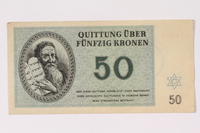
Theresienstadt ghetto-labor camp scrip, 50 kronen note acquired by a Jewish Czech woman
Object
Scrip valued at 50 kronen acquired by Elisabeth (Liese) Trausel who was imprisoned in Theresienstadt ghetto-labor camp from fall 1944 until liberation in May 1945. Liese lived in Prague when it was invaded in March 1939, by Germany and made part of the Protectorate of Bohemia and Moravia. The authorities passed new anti-Jewish regulations that severely restricted Liese’s daily life. In September, Germany invaded neighboring Poland. In September 1941, Liese was required to wear a yellow Star of David badge at all times to identify herself as Jewish. Later that month, Reinhard Heydrich became Reich Protector and soon there were almost daily deportations of Jews to concentration camps. Liese was married to a non-Jewish man and her daughters were considered half-Jewish, which exempted all three women from being transported. On December 13, 1942, Liese’s father Josef Polacek was facing deportation and instead committed suicide. In June and December 1943, many of the exemptions protecting particular groups were waived and more Jews were transported. On September 1, 1944, Liese was assigned to do compulsory work. Later that fall, she was transported to Theresienstadt ghetto-labor camp north of Prague. In April 1945, Hana was in the hospital and Eva was assigned to a compulsory work detail. Theresienstadt was taken over by the Red Cross on May 2, 1945. The war ended 5 days later when Germany surrendered. Liese returned to Prague. Many of her relatives and friends were killed in German concentration camps.
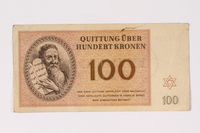
Theresienstadt ghetto-labor camp scrip, 100 kronen note acquired by a Jewish Czech woman
Object
Scrip valued at 100 kronen acquired by Elisabeth (Liese) Trausel who was imprisoned in Theresienstadt ghetto-labor camp from fall 1944 until liberation in May 1945. Liese lived in Prague when it was invaded in March 1939, by Germany and made part of the Protectorate of Bohemia and Moravia. The authorities passed new anti-Jewish regulations that severely restricted Liese’s daily life. In September, Germany invaded neighboring Poland. In September 1941, Liese was required to wear a yellow Star of David badge at all times to identify herself as Jewish. Later that month, Reinhard Heydrich became Reich Protector and soon there were almost daily deportations of Jews to concentration camps. Liese was married to a non-Jewish man and her daughters were considered half-Jewish, which exempted all three women from being transported. On December 13, 1942, Liese’s father Josef Polacek was facing deportation and instead committed suicide. In June and December 1943, many of the exemptions protecting particular groups were waived and more Jews were transported. On September 1, 1944, Liese was assigned to do compulsory work. Later that fall, she was transported to Theresienstadt ghetto-labor camp north of Prague. In April 1945, Hana was in the hospital and Eva was assigned to a compulsory work detail. Theresienstadt was taken over by the Red Cross on May 2, 1945. The war ended 5 days later when Germany surrendered. Liese returned to Prague. Many of her relatives and friends were killed in German concentration camps.
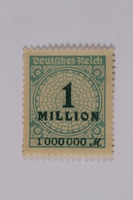
Postage stamp
Object
Elizabeth Trausel family collection
Document
The Elisabeth Trausel family collection consists of postcards sent to Elizabeth Trausel from relatives in the Theresienstadt ghetto. The contents of the postcards largely relate to receiving food parcels. The collection also includes ration cards issued in the ghetto, ghetto scrip, and a printed map of the ghetto.
Printed map of Theresienstadt Ghetto obtained by a Jewish Czech woman
Object
Single sided, printed, paper map of Theresienstadt ghetto labor camp acquired by Elisabeth (Liese) Trausel while imprisoned at the camp from late fall 1944 until liberation in May 1945. Liese was from Prague which was invaded in March 1939, by Germany and made part of the Protectorate of Bohemia and Moravia. The authorities passed new anti-Jewish regulations that severely restricted Liese’s daily life. In September, Germany invaded neighboring Poland. In September 1941, Liese was required to wear a yellow Star of David badge at all times to identify herself as Jewish. Later that month, Reinhard Heydrich became Reich Protector and soon there were almost daily deportations of Jews to concentration camps. Liese was married to a non-Jewish man and her daughters were considered half-Jewish, which exempted all three women from being transported. On December 13, 1942, Liese’s father Josef Polacek was facing deportation and instead committed suicide. In June and December 1943, many of the exemptions protecting particular groups were waived and more Jews were transported. On September 1, 1944, Liese was assigned to do compulsory work. Later that fall, she was transported to Theresienstadt ghetto-labor camp north of Prague. In April 1945, Hana was in the hospital and Eva was assigned to a compulsory work detail. Theresienstadt was taken over by the Red Cross on May 2, 1945. The war ended 5 days later when Germany surrendered. Liese returned to Prague. Many of her relatives and friends were killed in German concentration camps.
Permit to be out past curfew issued to a Jewish Czech woman
Object
Special pass issued to Elisabeth (Liese) Trausel by the Jewish Council of Prague granting her permission to be out on the streets before curfew expired on September 1, 1944. Liese was assigned to work as a mica splitter and in order to arrive on time she needed to leave before curfew ended. Prague was invaded in March 1939, by Germany and made part of the Protectorate of Bohemia and Moravia. The authorities passed new anti-Jewish regulations that severely restricted Liese’s daily life. In September, Germany invaded neighboring Poland. In September 1941, Liese was required to wear a yellow Star of David badge at all times to identify herself as Jewish. Later that month, Reinhard Heydrich became Reich Protector and soon there were almost daily deportations of Jews to concentration camps. Liese was married to a non-Jewish man and her daughters were considered half-Jewish, which exempted all three women from being transported. On December 13, 1942, Liese’s father Josef Polacek was facing deportation and instead committed suicide. In June and December 1943, many of the exemptions protecting particular groups were waived and more Jews were transported. On September 1, 1944, Liese was assigned to do compulsory work. Later that fall, she was transported to Theresienstadt ghetto-labor camp north of Prague. In April 1945, Hana was in the hospital and Eva was assigned to a compulsory work detail. Theresienstadt was taken over by the Red Cross on May 2, 1945. The war ended 5 days later when Germany surrendered. Liese returned to Prague. Many of her relatives and friends were killed in German concentration camps.
Sugar and coffee ration card stub issued to a Jewish Czech woman
Object
Ration card stub for nutrient and sugar, valid from September 18 – October 15, 1944, issued to Elisabeth (Liese) Trausel by the Ministry of Land and Forestry of Bohemia and Moravia. During the war food was strictly rationed in German controlled regions and Jews were allowed much smaller portions than the general public. To identify the owners as Jewish, the cards were first stamped with a large J and later the entire card was covered with inscriptions of “Jude’. Liese was from Prague, which was invaded in March 1939, by Germany and made part of the Protectorate of Bohemia and Moravia. The authorities passed new anti-Jewish regulations that severely restricted Liese’s daily life. In September, Germany invaded neighboring Poland. In September 1941, Liese was required to wear a yellow Star of David badge at all times to identify herself as Jewish. Later that month, Reinhard Heydrich became Reich Protector and soon there were almost daily deportations of Jews to concentration camps. Liese was married to a non-Jewish man and her daughters were considered half-Jewish, which exempted all three women from being transported. On December 13, 1942, Liese’s father Josef Polacek was facing deportation and instead committed suicide. In June and December 1943, many of the exemptions protecting particular groups were waived and more Jews were transported. On September 1, 1944, Liese was assigned to do compulsory work. Later that fall, she was transported to Theresienstadt ghetto-labor camp north of Prague. In April 1945, Hana was in the hospital and Eva was assigned to a compulsory work detail. Theresienstadt was taken over by the Red Cross on May 2, 1945. The war ended 5 days later when Germany surrendered. Liese returned to Prague. Many of her relatives and friends were killed in German concentration camps.
Sugar and coffee substitute ration card stub issued to a Jewish Czech woman.
Object
Ration card stub for coffee substitute valid from February 8 – March 71943, issued to Elisabeth (Liese) Trausel by the Ministry of Land and Forestry. During the war food was strictly rationed in German controlled regions and Jews were allowed much smaller portions than the general public. To identify the owners as Jewish the cards were first stamped with a large J and later the entire card was covered with inscriptions of “Jude’. Liese was from Prague, which was invaded in March 1939, by Germany and made part of the Protectorate of Bohemia and Moravia. The authorities passed new anti-Jewish regulations that severely restricted Liese’s daily life. In September, Germany invaded neighboring Poland. In September 1941, Liese was required to wear a yellow Star of David badge at all times to identify herself as Jewish. Later that month, Reinhard Heydrich became Reich Protector and soon there were almost daily deportations of Jews to concentration camps. Liese was married to a non-Jewish man and her daughters were considered half-Jewish, which exempted all three women from being transported. On December 13, 1942, Liese’s father Josef Polacek was facing deportation and instead committed suicide. In June and December 1943, many of the exemptions protecting particular groups were waived and more Jews were transported. On September 1, 1944, Liese was assigned to do compulsory work. Later that fall, she was transported to Theresienstadt ghetto-labor camp north of Prague. In April 1945, Hana was in the hospital and Eva was assigned to a compulsory work detail. Theresienstadt was taken over by the Red Cross on May 2, 1945. The war ended 5 days later when Germany surrendered. Liese returned to Prague. Many of her relatives and friends were killed in German concentration camps.
Bread rolls and flour ration card stub issued to a Jewish Czech man
Object
Ration card stub for bread rolls, valid from July 6-August 2, 1942 issued to Josef Polacek by the Ministry of Land and Forestry. During the war food was strictly rationed and Jews were allowed much smaller portions than the general public. To identify them as Jewish the cards were first stamped with a large J and later the entire card was covered with inscriptions of “Jude’. Josef lived in Prague when it was invaded in March 1939, by Germany and made part of the Protectorate of Bohemia and Moravia. The authorities passed new anti-Jewish regulations that severely restricted Josef’s daily life. In September, Germany invaded neighboring Poland. In September 1941, Josef was required to wear a yellow Star of David badge at all times to identify himself as Jewish. Later that month, Reinhard Heydrich became Reich Protector and soon there were almost daily deportations of Jews to concentration camps. On December 13, 1942 Josef committed suicide rather than being deported east. On May 7, 1945 Germany surrendered, ending the war. Josef’s daughter, Elisabeth (Liese) Trausel and granddaughter, Hana Trausel (later Rehakova) both survived the war.
Potato ration card stub issued to a Jewish Czech man for potatoes
Object
Ration card stub for potatoes, valid from September 29 1941 – July 5 1942 issued to Josef Polacek by the Ministry of Land and Forestry. During the war food was strictly rationed in German controlled regions and Jews were allowed much smaller portions than the general public. To identify the owners as Jewish the cards were first stamped with a large J and later the entire card was covered with inscriptions of “Jude’. Josef lived in Prague when it was invaded in March 1939, by Germany and made part of the Protectorate of Bohemia and Moravia. The authorities passed new anti-Jewish regulations that severely restricted Josef’s daily life. In September, Germany invaded neighboring Poland. In September 1941, Josef was required to wear a yellow Star of David badge at all times to identify himself as Jewish. Later that month, Reinhard Heydrich became Reich Protector and soon there were almost daily deportations of Jews to concentration camps. On December 13, 1942 Josef committed suicide rather than being deported east. On May 7, 1945 Germany surrendered, ending the war. Josef’s daughter, Elisabeth (Liese) Trausel and granddaughter, Hana Trausel (later Rehakova) both survived the war.



